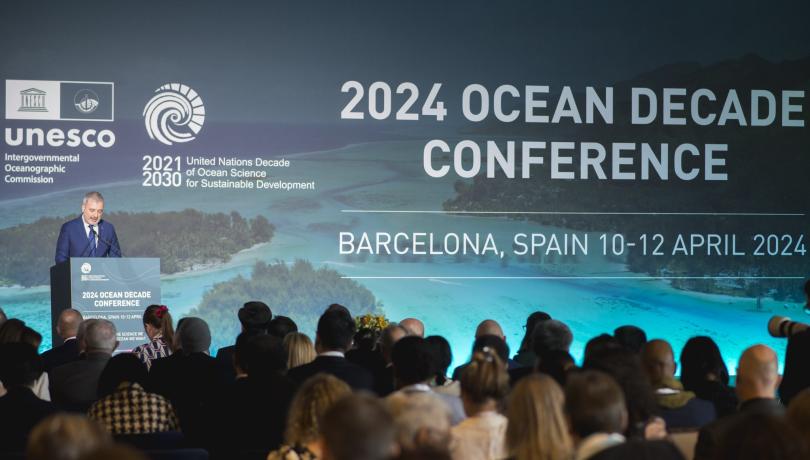The project, led by the consistory of the Catalan capital with the Port of Barcelona as a key partner, has the collaboration of the Institut de Ciències del Mar del CSIC and BlueNetCat, the Maritime R+D+I network of Catalonia.

The Institut de Ciències del Mar (ICM-CSIC) is one of the four partners of the candidacy presented by the Barcelona City Council to host a collaborating center of the UNESCO Decade of the Ocean, Ocean Decade Collaborative Centre (DCC), which focuses its activity on the development of the blue economy. This was announced by Mayor Jaume Collboni during the opening ceremony of the Ocean Decade Conference, which takes place until Friday at the Barcelona International Convention Center (CCIB) and brings together more than 1,500 people from the ocean community to focus on the challenges and opportunities related to the sustainability of the oceans.
The DCC that Barcelona is bidding to host will be promoted by the City Council, which will be the lead partner in collaboration with the Port of Barcelona as a key partner, as well as with two outstanding science partners of the highest recognition and prestige. On the one hand, the Institut de Ciències del Mar (ICM-CSIC), the only marine research center in Spain recognized with the "Severo Ochoa" accreditation of excellence, a distinction awarded to leading research organizations in their field of knowledge at international level. On the other hand, BlueNetCat, the largest network of blue economy experts in Europe. The Network, which integrates more than 800 scientists from the main Catalan universities and research institutes, is the innovation and transfer instrument of the Catalan Maritime Agenda of the Directorate General of Maritime Policy and Sustainable Fisheries of the Government of Catalonia.
Collboni has communicated Barcelona's intention to become the first city to lead one of the ten challenges set by the United Nations in the defense of marine ecosystems, since the CDDs that have been announced so far are led from entities such as universities or research centers.
Specifically, the Catalan capital would host a space focused on challenge number four of the Decade of the Ocean, which refers to developing a sustainable and equitable ocean economy. That is, to advance the development of the blue economy in which Barcelona is already a benchmark in the Mediterranean. This sector already represents 4.3% of GDP and 1.4% of the city's employment. With this new step, Barcelona would become UNESCO's benchmark in the blue economy, with a world-class center in the Catalan capital.
"Cities must have their voice and from Barcelona we are already working with other Mediterranean cities to promote the restoration of marine ecosystems and protect the biodiversity they host" explained the Mayor of Barcelona, Jaume Collboni. "Cities are an essential part of the solution and that solution involves two essential elements. First, more and better science. Second, more sustainable progress, that is to say, more blue economy. In this sense, the Decade of the Ocean Conference may represent a change of course," he added.
From his side, Valentí Sallarès, the ICM-CSIC director has pointed out:
“From the ICM-CSIC we enthusiastically support the initiative of the Barcelona City Council to host the Coordinating Center for the Decade in Blue Economy in the city. Partnering with the City Council, the Port of Barcelona and the BlueNetCat Network in this initiative represents an excellent opportunity to strengthen the social impact of our research through the transfer of knowledge to the public and private sector, and to value, at the same time, the legacy of the Oceans Conference".
Barcelona's candidacy will be reviewed by UNESCO in September with the aim of opening the center before the end of the year. The DCC would be in the city for a minimum of five years.
Barcelona, the best location to create the Blue Economy CDD
Barcelona, one of the most innovative cities in Europe, has several assets that position it to give this CDD the impetus and projection it needs from the Mediterranean. Within the BCN Green Deal Agenda, the strategic commitment of the city of the future to combine progress and sustainability, the blue economy is established as one of the main levers for generating employment and competitiveness. The city, moreover, already hosts some of the main international maritime events, such as the upcoming America's Cup Sailing 2024 or the Tomorrow.BlueEconomy within the framework of the Smart City Expo and World Congress.
Barcelona is the first city at the state level, the eighth in the European Union and the twentieth worldwide in terms of scientific production, thanks to an ecosystem of international prestige composed of more than 80 research centers. And it has several mechanisms to promote knowledge transfer, such as the BCN DeepTech Node, with the five universities of Barcelona, or the Deep Tech fund, to accelerate investments in spin-off companies in the research sector.
Likewise, the Port of Barcelona is the most diversified in Europe, with a clear commitment and leadership in terms of decarbonization of the maritime-port sector, contributing 2% to the GDP of Catalonia and with a clear commitment to innovation. Some of the most cutting-edge innovation hubs in Europe, such as BlueTechPort, Pier 01 of TechBarcelona or Norrsken Foundation, are concentrated within the port territory.
About the Decade of the Ocean Conference
The 2024 Decade of the Ocean Conference, which started today at the CCIB, will feature more than 40 international speakers until Friday. It is organized under the title The science we need for the ocean we want and should stand as the global forum to bring together governments, experts from different fields, maritime sectors, universities, NGOs, the private sector and civil society. It is an event that has generated great international interest with more than 5,000 registered requests to attend and brings together some 1,500 people from the ocean community. Throughout the week, more than 120 parallel events are organized, many of them open to the public, to focus on the care of the oceans.